Lexicon of the terms used on shoot'em up games, 1st part.
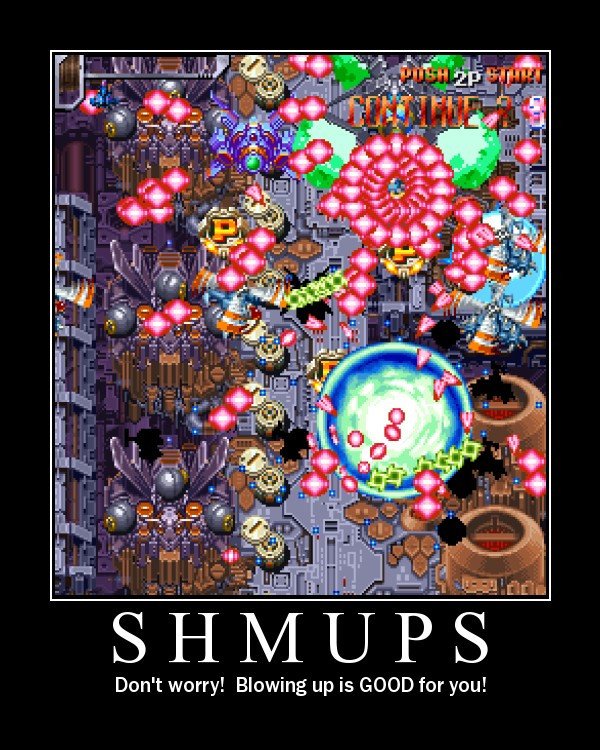
If there is one genre that I like above all, it is indeed the shoot'em up. As basic and simplistic as this genre can appear, it turns out that as it evolves it integrates gameplay mechanisms much more complex than it seems. So it is in a worry of understanding towards my readership that I am working to write this lexicon which will detail, point by point, certain words and expressions used coming from the cosmic world of the shoot'em up.
The list is long and contain all definitions is impossible on one and the same page. It is thus for a better readability that this mini-wiki of the shooting game will be divided in two parts. Of course, this may not be all-inclusive and will need to be updated if any essential words or expressions are missing.
1cc: common abbreviation for "one credit count". This term refers to ending a game of the genre in one credit, without continuity. The 1cc is the main goal of most shoot'em up and a consecration for the player.
Bomb: is also called "Smart-Bomb" which can translate literally by intelligent bomb. The bomb is a means made available to the player that allows him to destroy a quantity, more than considerable, of enemies on the screen. The advantage of the smart-bomb, in most games, is to grant simulated invulnerability during a short time course. It is also useful as a "Bullet Cancelling" to clean the projectile screen. The Bomb, well used, is an essential element to the survival of the player in the ruthless world of shooting game. There are some titles using the principle of the smart-bomb in order to increase considerably the score, Battle Garegga as well as Ibara use this system of play.
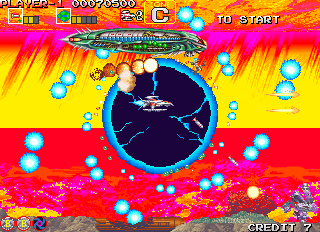
Bullets: that is no less than the familiar way of designating enemy projectiles in the terms of shoot'em up. Generally round, the bullet can take other more original aspects and use different colors to differentiate.
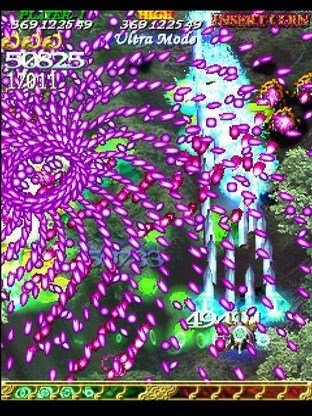
Bullet Cancelling: Under this somewhat barbaric term hides an essential element to the game system of a large majority of "Danmaku". The "Bullet Cancelling" is an action to cancel the breaking of patterns on the screen, either by destroying a specific enemy, bulging, using a switch or hyper, or picking up an item. The "Bullet Cancelling" can be a source of scoring in some titles but also a very good way of survival which saves the stock of bombs. Dodonpachi Daiffukatsu or Mushihime-sama Futari use this element in their gameplay.
Caravan Stage: Introduced by Hudson-Soft on its Star Soldier series, Caravan Stage will feature on this first title. A "score-attack" before time, this mode was a challenge that took advantage of the player's ability to get the best score in a time limit. Developed primarily to launch a summer coucours, in Japan, the Caravans had an enormous success thanks in particular to the participation of Takahashi Meijin during his tours throughout japan.
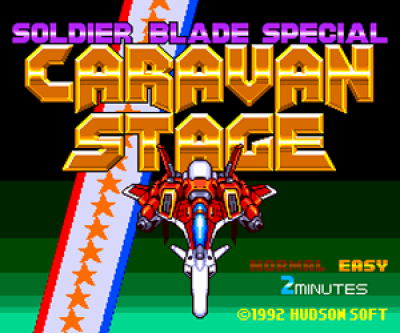
Chain: can be assimilated to combos in a fighting game, the principle of the chain in a shooting game is an essential element to the scoring and sometimes the gameplay of the title. A chain is a succession of enemy destruction, either in a specific order, or continuously in a given time. Established in 1995 on the first Cave's game, Donpachi, this system will find its apogee in Radiant Silvergun developed by Treasure in 1998. So the title forces the player to play with this principle to upgrade the weapons of his ship. As a reminder, Radiant Silvergun does not use "power up" for the upgrade of the different weapons but a system of experience, similar to the RPG, based on the execution of the different chains.
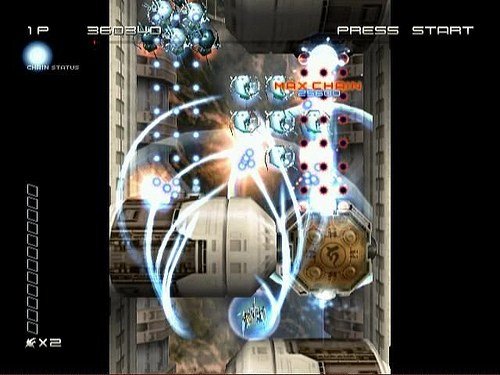
Cute'em up: Sub genre of shooting game. The cute'em up is used to designate a game of the kind using a colorful graphic aspect, not based on the recurrent theme of the war but more childish to see sexy. Lying more on the imaginary side and containing many clichés in order to reinforce the aesthetic "adorable", the cute'em up uses and abuses, generally, of stereotypes typical of Japanese pop-culture. Lolitas, maids, pet animals with fun shapes and mostly sporting a manga / animated style, are recurring elements in most of these games. Although the term appeared in the 2000s, this category originated in older productions with parodic accents. We can cite the series of Parodius but also Twinkle Star Sprites or even more recently, Deathsmiles.
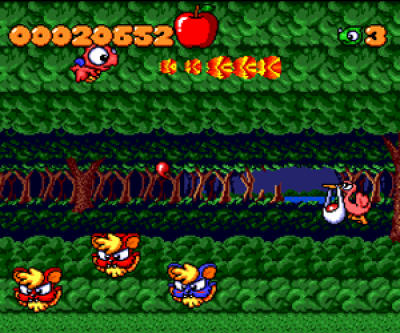
End of part 1